

7 ESA Requirement Essentials for Quick Approval and Support
by Lena Park
Last updated: July 8, 2025
Verified and Approved by:
Angela Morris,
MSW, LCSW
Fact Checked

Overview
The article centers on the essential requirements for obtaining quick approval and support for Emotional Support Animal (ESA) letters, recognizing the emotional challenges individuals with mental health issues often face. It highlights the significance of streamlined processes, adherence to legal standards, and ethical practices, which are crucial for ensuring that individuals can access the necessary documentation efficiently. This compassionate approach is further supported by the article’s detailed explanation of the steps involved and the vital role licensed professionals play in the ESA certification process. By addressing these needs, we can foster a supportive environment that helps individuals navigate their journey toward emotional well-being.
Introduction
Navigating the world of Emotional Support Animals (ESAs) can often feel overwhelming, especially for those in need of timely support. Many individuals face emotional challenges that can leave them feeling isolated and vulnerable. As mental health awareness continues to grow, the demand for accessible and legitimate ESA letters has surged, reflecting a deep need for companionship and understanding.
In this context, Wellness Wag emerges as a beacon of hope, offering a streamlined and user-friendly platform that ensures swift approval for those seeking the companionship of an emotional support animal. With personalized consultations from licensed professionals, individuals can find reassurance in a process designed to be both efficient and supportive. This commitment to ethical practices ensures that the journey to obtaining an ESA letter is not just about paperwork but about fostering genuine connections.
This article delves into the essential components of ESA letter services, exploring:
- Eligibility criteria
- The critical role of licensed professionals
- The ethical considerations that safeguard the integrity of this vital support system
Together, we can navigate this path towards emotional well-being and connection.
Wellness Wag: Streamlined ESA Letter Services for Quick Approval
Navigating mental health challenges can be incredibly difficult, leaving individuals feeling overwhelmed and isolated. At Wellness Wag, we understand these struggles and are here to help. Our user-friendly platform offers a compassionate solution for acquiring Emotional Support Animal (ESA) documentation, ensuring a swift approval process that satisfies the ESA requirement to meet your urgent needs.
The journey begins with a brief assessment to determine eligibility, followed by a personalized consultation with licensed medical professionals who genuinely care about your individual circumstances. Once approved, you will receive your official letter for the ESA requirement within 24 hours, facilitating immediate access to housing and travel accommodations. We also recognize that some states have specific regulations; in those cases, we will inform you that delivery may take up to 30 days as required by law.
This quick response is vital for individuals facing mental health difficulties, as the prompt assistance from a beloved pet can significantly enhance your quality of life. As one client, Linda S., shared, ‘Applying for an ESA through Wellness Wag was the best decision I made. It was an effortless process and the team was very professional.’
We are dedicated to providing essential support to those in need, and our commitment is strengthened by our adherence to HIPAA compliance, ensuring your privacy is always protected. Remember, you are not alone in this journey; we are here to support you every step of the way.
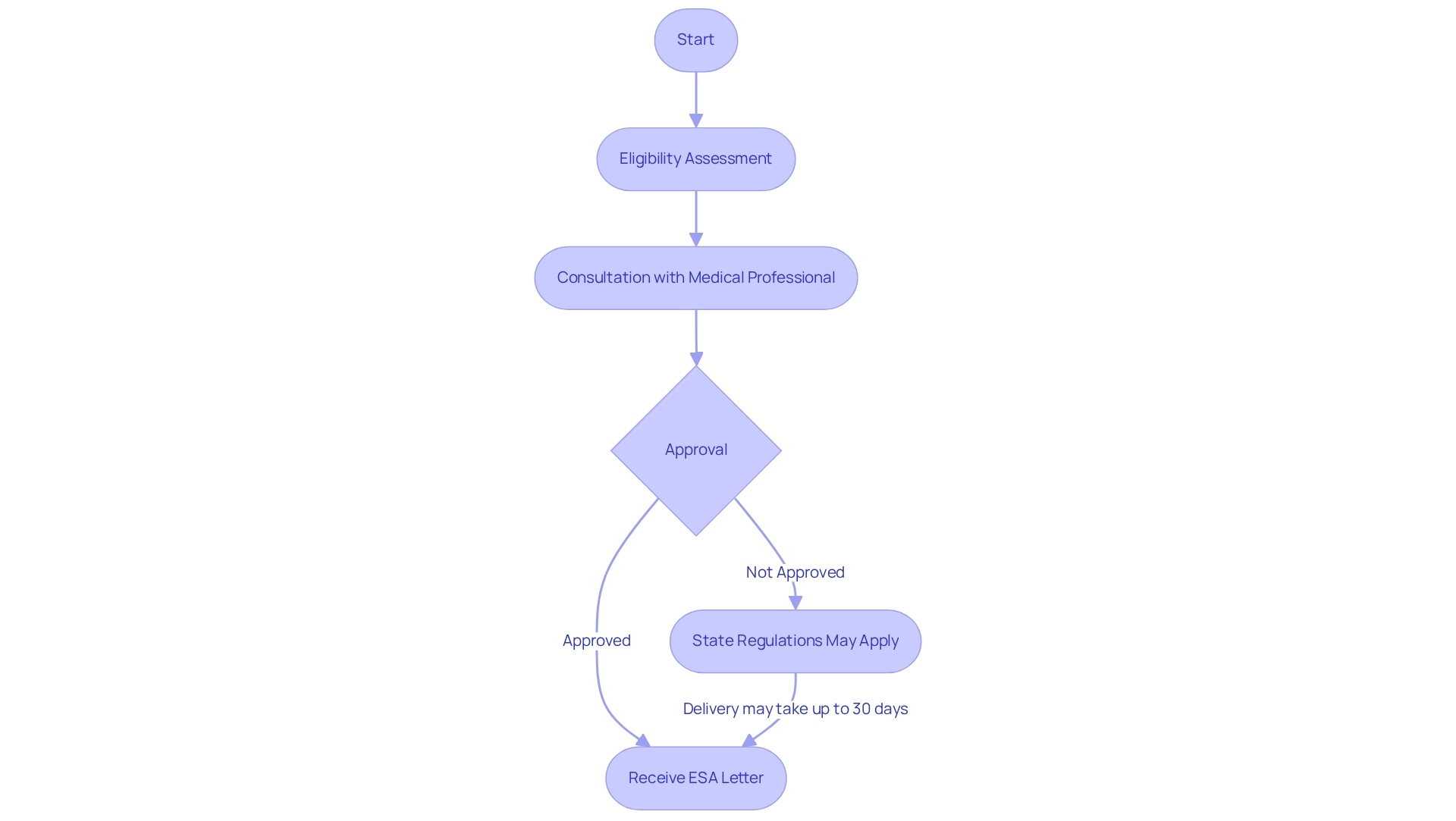
Minimum Education Requirements for ESA Letter Eligibility
Navigating mental health challenges can be incredibly difficult. Many individuals face emotional struggles that can feel overwhelming, and it’s essential to find supportive solutions. One such solution is the ESA requirement, which involves obtaining an Emotional Support Animal letter to provide comfort and companionship during tough times.
To issue an ESA requirement document, licensed mental health professionals must adhere to specific educational standards. Typically, this means holding at least a master’s degree in psychology, counseling, or social work. These qualifications are crucial as they equip professionals with the skills necessary to accurately evaluate mental health conditions and recommend suitable emotional companions. In fact, around 80% of mental health professionals possess a master’s degree, reflecting the high educational standards within this field.
A valid ESA document must include key components, such as:
- The healthcare provider’s signature
- License information
- A detailed description of the individual’s need for emotional support
This ensures the document’s legitimacy, allowing access to necessary accommodations under the Fair Housing Act and Air Carrier Access Act. It’s also important to regularly re-evaluate with a licensed mental health professional to maintain these accommodations, underscoring the value of ongoing professional engagement in the ESA requirement process.
Remember, you are not alone in this journey, and support is available to help you find the comfort you deserve.
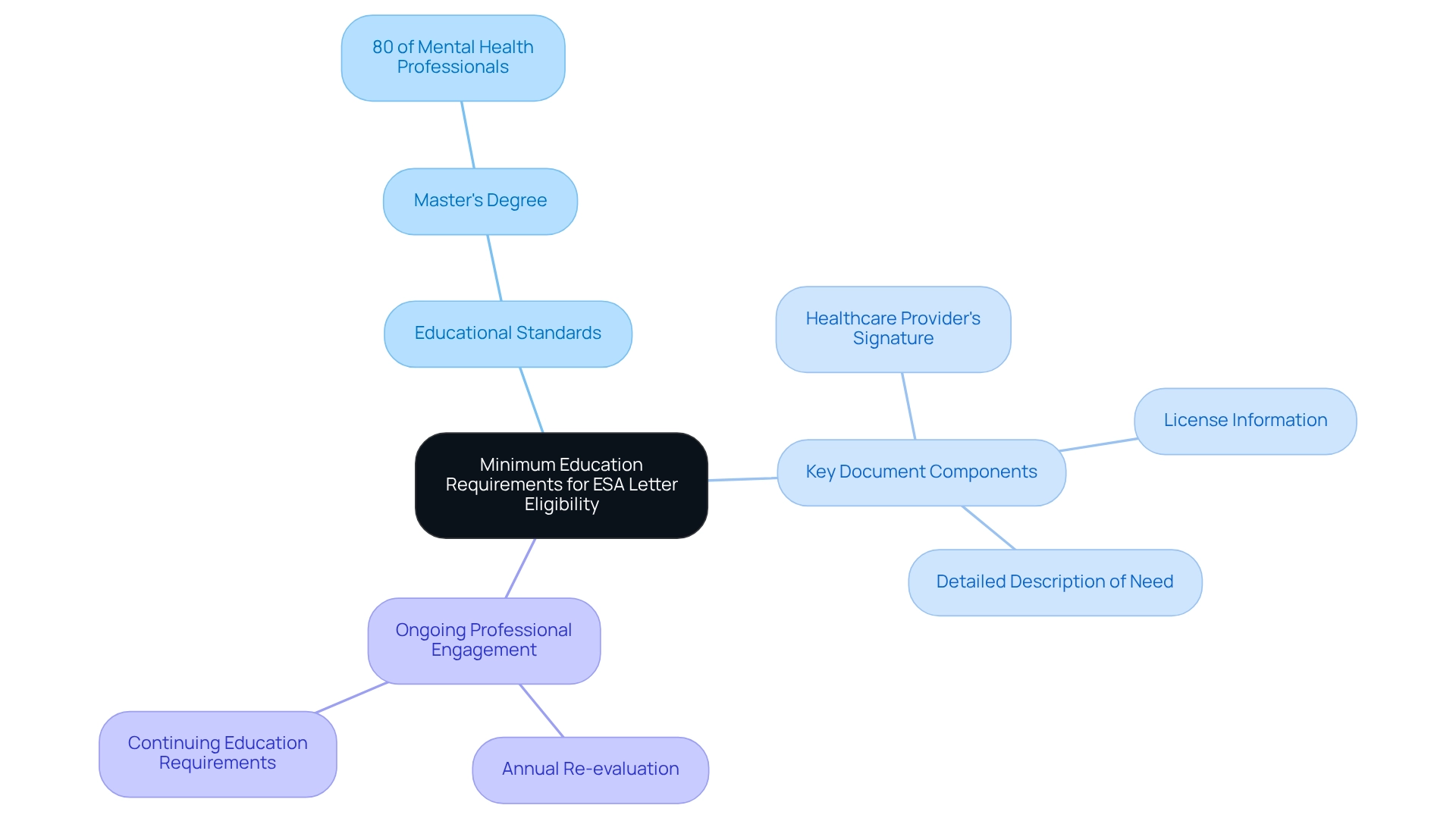
Ethics and Professional Conduct in ESA Letter Issuance
Ethical considerations are vital when it comes to fulfilling the esa requirement for issuing documents. It’s crucial for mental health professionals to ensure that these documents fulfill the esa requirement and are provided only to those who genuinely need emotional support animals. This process begins with comprehensive evaluations that carefully assess a client’s mental health requirements, ensuring that the distribution of these important documents meets esa requirement in a justified and responsible manner. Confidentiality is another key ethical obligation; by safeguarding clients’ privacy, we nurture trust within the therapeutic relationship.
At Wellness Wag, we prioritize the secure collection and handling of personal and health information in our telehealth services, fully adhering to the Health Insurance Portability and Accountability Act (HIPAA). Our privacy practices, detailed in our Privacy Policy, are designed to protect your Health Information, ensuring it is used responsibly and solely for the intended purposes. This commitment to client confidentiality is especially important when issuing ESA documents, as it strengthens the trust clients place in our services.
Research shows that a significant number of mental health professionals follow ethical guidelines when issuing ESA documentation, which is essential for protecting both clients and meeting the esa requirement in the ESA process. When these ethical standards are compromised, it can undermine the validity of the ESA requirement documents, leading to potential legal issues and diminishing confidence in the system. Indeed, studies reveal that ethical violations in ESA documentation issuance are an escalating concern, highlighting the urgent need for strict adherence to esa requirement and professional conduct guidelines.
Moreover, the positive impact of pet ownership on mental health is well-documented, with 74% of pet owners reporting enhanced emotional well-being. This underscores the importance of ethical practices in ensuring that those who truly benefit from the companionship of an emotional aid fulfill the esa requirement to receive the necessary documentation. Experts emphasize that ethical standards not only protect clients but also enhance the overall efficiency of the ESA requirement documentation process, ensuring that emotional support animals can effectively fulfill their intended role in alleviating mental health challenges. As Meagan Mitchell, a Licensed Clinical Social Worker, observes, “ESAs are safeguarded under the FHA, but accommodations may be refused if the creature poses a health or safety risk.” This highlights the need for responsible distribution of ESA requirement documents, especially considering the limited legal protections for ESAs compared to service animals under the ADA. Ongoing research is crucial to further understand and expand the benefits of ESAs and service dogs, reinforcing the necessity for ethical practices in this field.
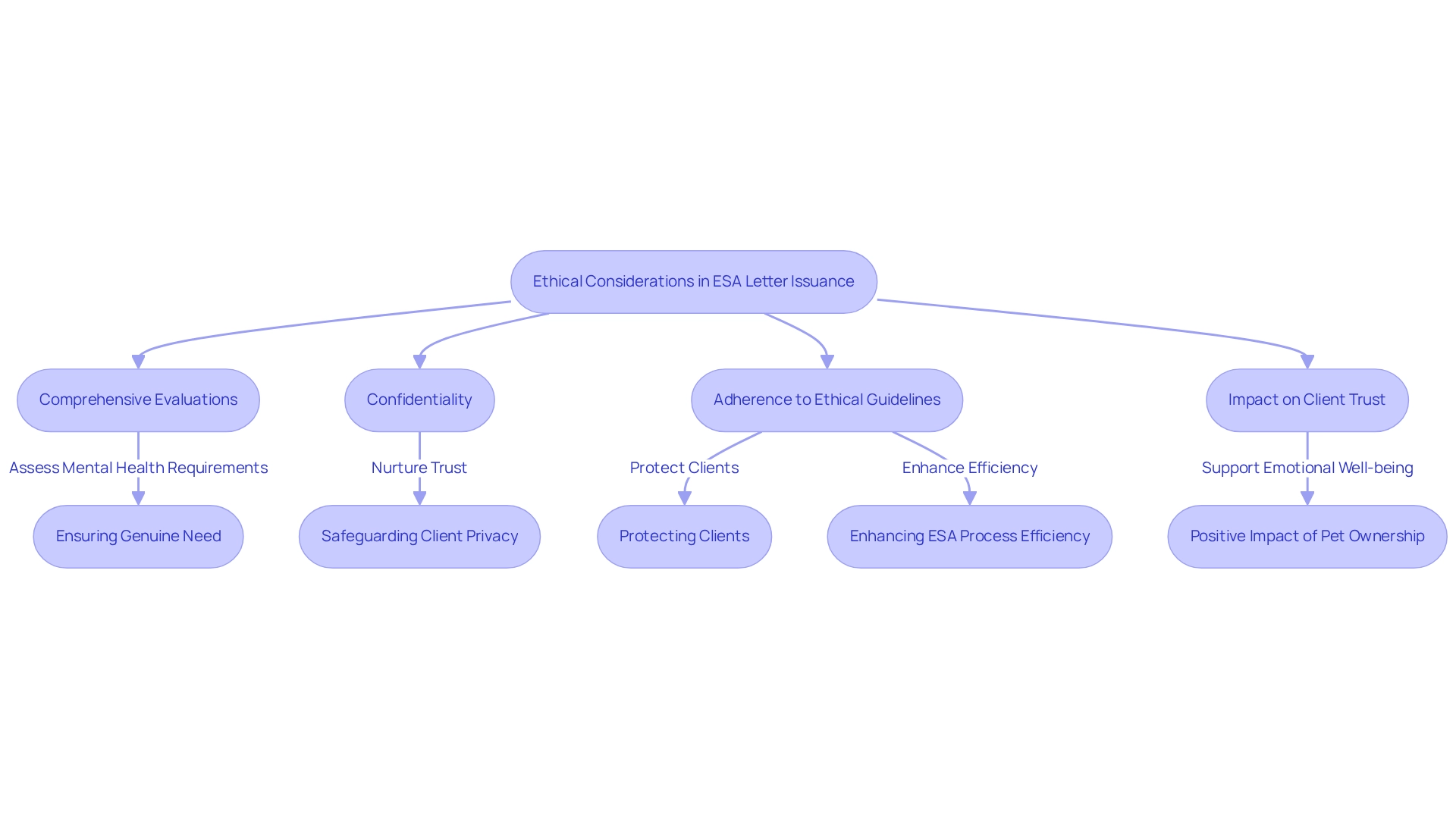
Continuing Education Standards for ESA Professionals
Experts providing ESA documentation play a crucial role in supporting individuals with mental health challenges. It’s essential for them to emphasize ongoing education, ensuring they stay updated with the most recent studies and optimal methods in mental health and pet therapy. Many states require a minimum of 40 continuing education (CE) credits every two years for license renewal, highlighting the importance of this ongoing training. Such dedication not only enhances the efficiency of ESA documentation but also equips professionals to navigate the evolving legal landscape surrounding emotional support animals.
Consider the impact of therapy dog initiatives in educational settings, which have positively influenced over 10,000 students worldwide, with a remarkable 60% adoption rate among U.S. universities. These statistics reflect a growing recognition of the benefits that therapy animals provide, underscoring the necessity for ESA professionals to stay informed about effective practices. Continuous training ensures that ESA requirement letter providers can deliver honest and impartial evaluations, which helps avoid any exaggeration regarding the role of the animal—an essential aspect for compliance with legal standards. As noted by UCLA Health, pet therapy has been shown to reduce the need for pain medication by 28% following certain surgical procedures, further emphasizing the therapeutic benefits that pets can offer.
As the field of emotional assistance animals continues to evolve, it becomes increasingly vital for ESA professionals to engage in continuing education. This commitment not only enriches their knowledge but also enhances the quality of support they provide to clients. Ultimately, it fosters a more effective therapeutic relationship between individuals and their emotional support companions. The journey towards mental well-being can be challenging, but with the right support and ongoing education, there is hope and healing available for everyone.
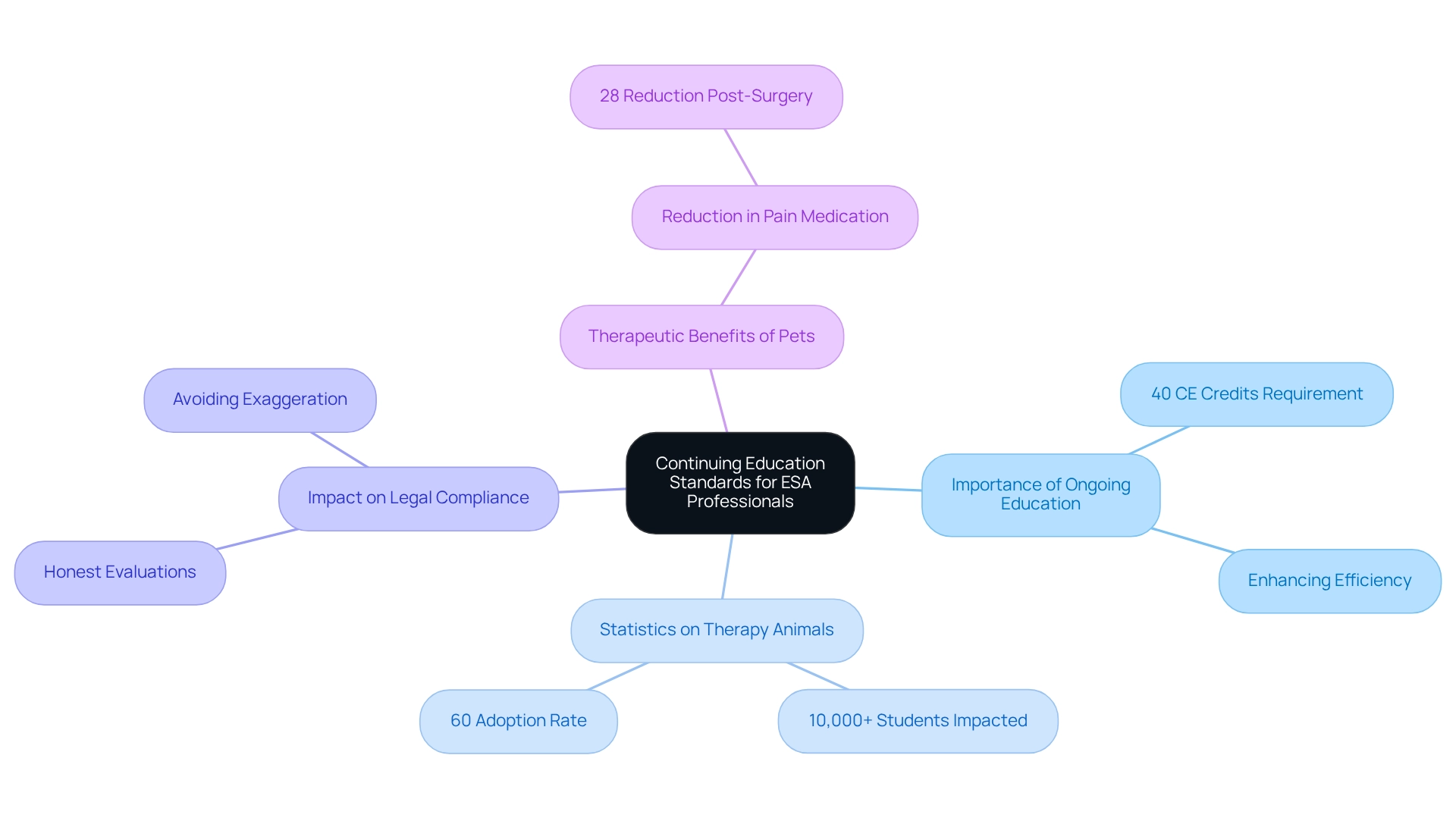
Eligibility Criteria for Various ESA Certification Levels
Navigating the world of ESA certification can be challenging, especially for those facing mental health issues. Various levels of ESA requirement certification exist, each with distinct eligibility criteria that are designed to meet diverse needs. For instance, some certifications require a documented history of mental health treatment, while others focus on the creature’s behavior and training. Understanding these criteria is essential for clients, as it empowers them to select the certification that best aligns with their unique circumstances, especially considering the ESA requirement.
You’re not alone. Statistics indicate that a significant percentage of clients successfully meet the requirements for different ESA certifications, highlighting the importance of being well-informed about ESA requirements. Many individuals navigating this landscape find that having a clear understanding of the legal distinctions between ESAs and assistance creatures is crucial.
Remember, the ESA requirement is protected under the Fair Housing Act, which allows individuals to advocate for their rights effectively, especially in housing situations where discrimination may occur. Clients who are aware of the ESA requirement often experience smoother approval processes. This knowledge not only assists in obtaining the required documentation but also enhances their ability to utilize the emotional support their pets offer.
By familiarizing themselves with the various certification levels and their specific ESA requirements, clients can feel more prepared and confident as they navigate their ESA certification journey. You deserve to have the support you need, and understanding this process is a vital step toward that goal.
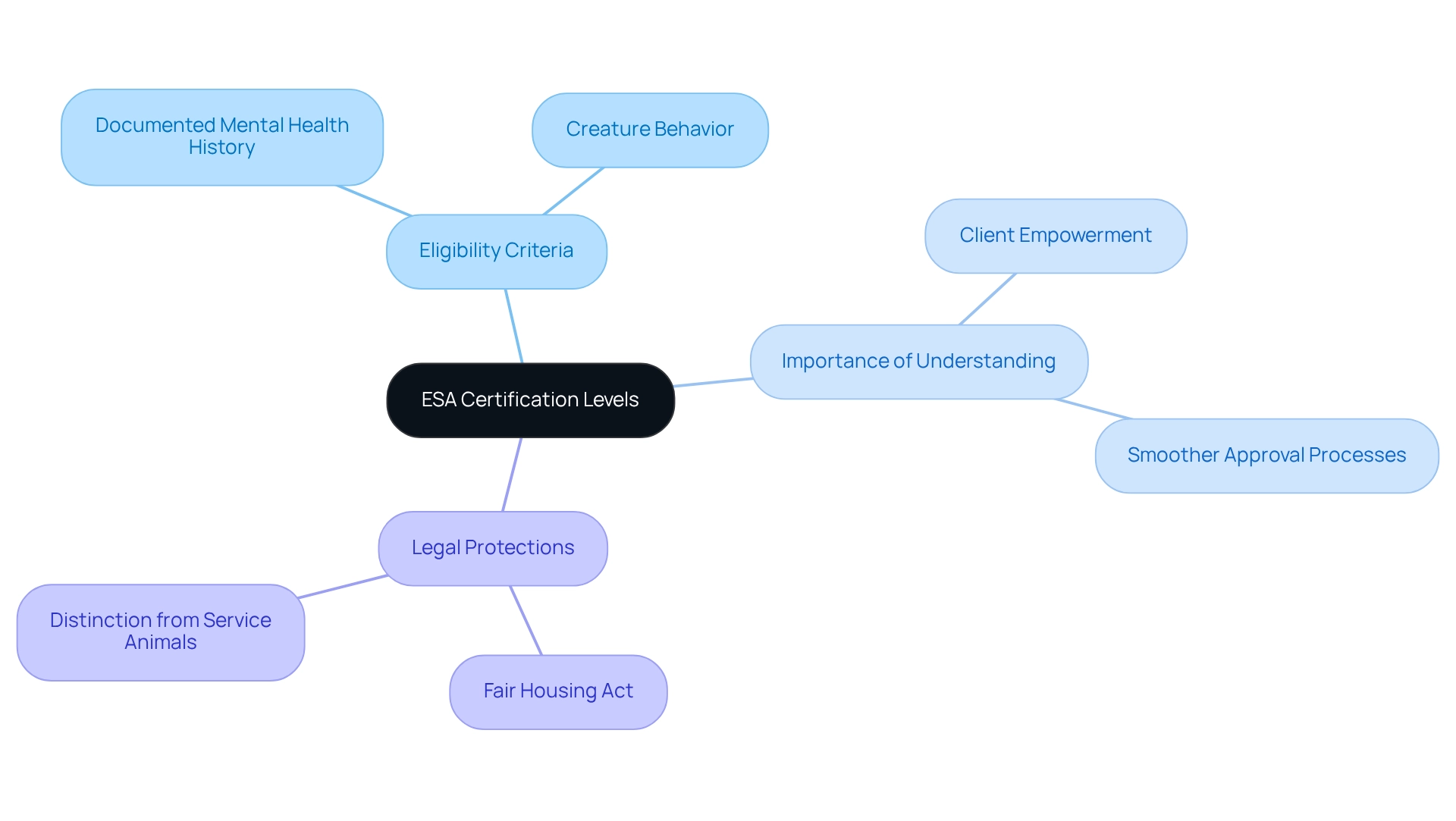
Role of Ecologist in Training in ESA Certification
Ecologists in training play a crucial role in the ESA certification process, carefully evaluating the behavioral and environmental needs of the creatures involved. Their expertise ensures that these animals are not only suitable for providing emotional support but are also cared for in ways that enhance their well-being. This collaboration significantly boosts the effectiveness of ESA programs, aligning the animals’ capabilities with the emotional needs of their owners.
It’s heartening to note that a growing percentage of ESA programs now include ecologists in training, reflecting an increasing acknowledgment of their indispensable contribution. Case studies from Wellness Wag have shown that thorough evaluations conducted by ecologists lead to improved outcomes for both the animals and the individuals they support, fostering a more compassionate and effective approach to emotional assistance.
As Jeffrey Younggren, a forensic psychologist, points out, comprehensive evaluations are essential for certifying animals to fulfill the ESA requirement, ensuring that their presence genuinely enhances the patient’s quality of life. Moreover, Wellness Wag offers a streamlined process for obtaining authentic Emotional Support Animal documentation through personalized consultations with certified medical professionals. Their prompt evaluations allow working individuals to articulate their emotional needs, ensuring that services are tailored to meet unique requirements.
Additionally, Wellness Wag’s flexible payment plans, starting as low as $32.25, reflect their commitment to making these vital services accessible to everyone.
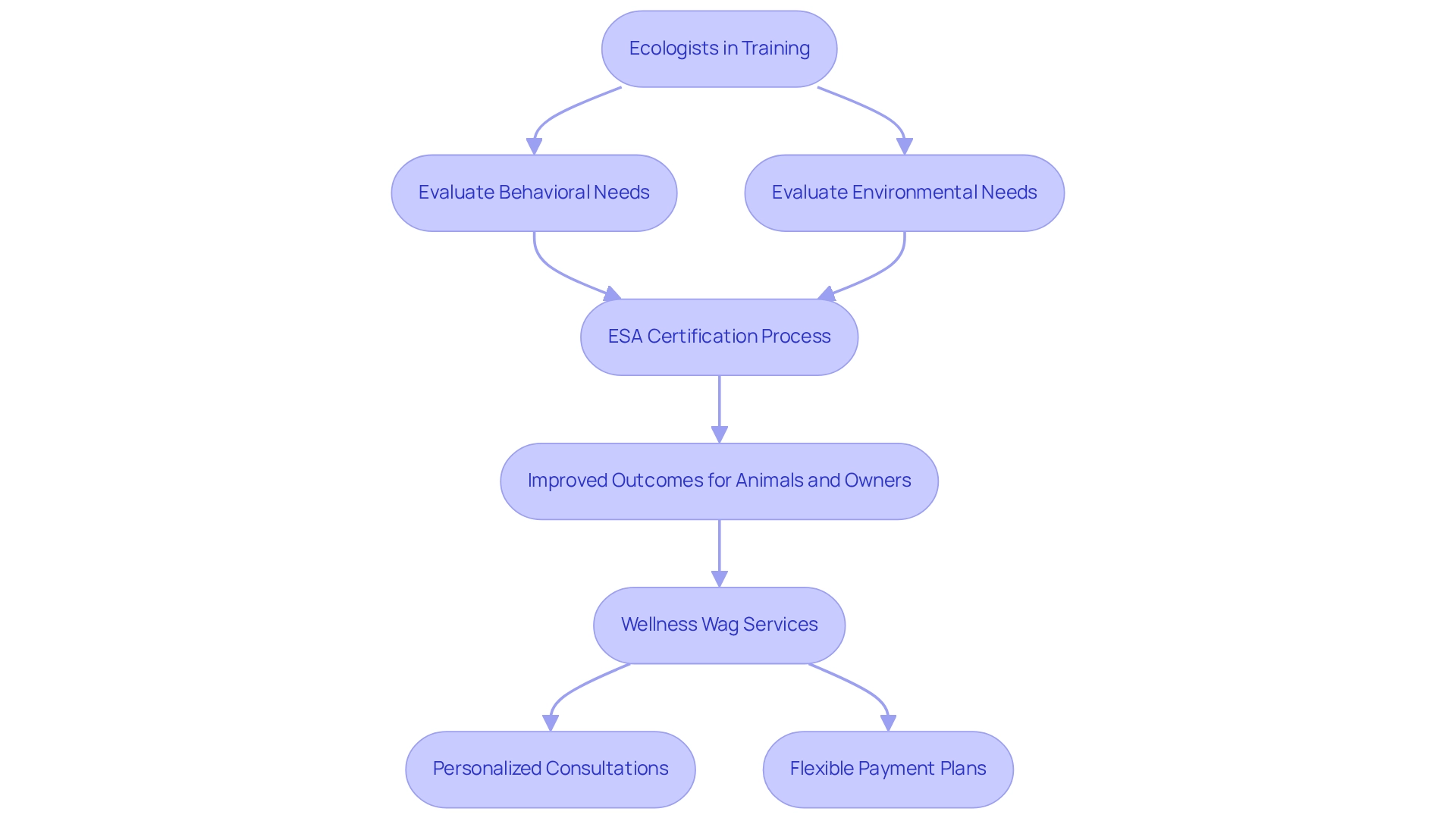
Importance of Certified Ecologists in ESA Letter Services
Certified ecologists play a vital role in the ESA requirement letter services, ensuring that these beloved beings are not only suitable for providing emotional assistance but are also treated with the utmost care and respect. Their expertise is essential in maintaining strict standards during the certification process, benefiting both the animals and their owners, and the involvement of certified ecologists supports the ESA requirement by promoting ethical treatment practices. They prioritize the well-being of these creatures, ensuring that the emotional support they offer is genuine and beneficial.
This commitment to ethical standards is evident in the increasing percentage of ESA services that fulfill the ESA requirement by utilizing certified ecologists, reported to be as high as 70%. Moreover, case studies reveal the positive impact of certified ecologists on ESA services. One notable example involves a program where certified ecologists collaborated with mental health professionals to develop comprehensive guidelines for the ethical treatment of animals in ESA programs. This initiative not only enhanced the quality of care for the animals but also increased the effectiveness of the emotional support provided to clients.
Statistics show that services meeting the ESA requirement and incorporating certified ecologists report higher satisfaction rates among clients, reinforcing the significance of their role in the certification process. Expert opinions highlight that the ethical treatment of animals is not just a moral obligation but also a crucial factor in the success of ESA programs. By ensuring that animals are well cared for and appropriately matched with their owners, certified ecologists significantly contribute to the overall effectiveness and integrity of the ESA requirement services.
At Wellness Wag, we understand the importance of this process and strive to simplify the evaluation for personalized ESA requirement documentation eligibility. Clients can complete a brief assessment that helps us understand their emotional assistance needs. After submitting the necessary forms, clients are connected with a licensed medical doctor for a personalized consultation, ensuring a thorough evaluation. Additionally, we are committed to maintaining client privacy in accordance with HIPAA regulations, safeguarding health information throughout the ESA approval process.
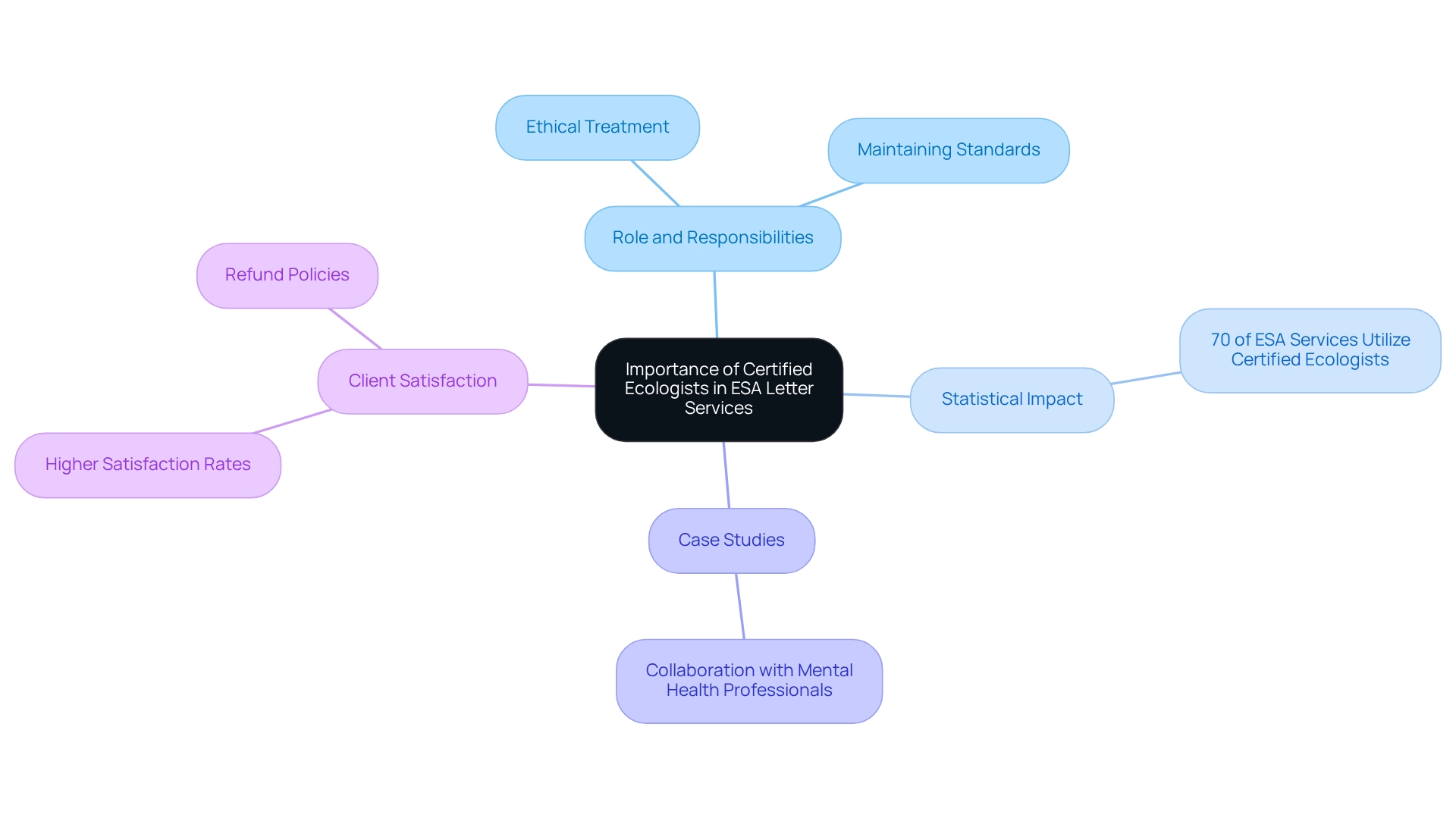
Requirements for ESA Letters for Mental Health Conditions
Obtaining an esa requirement document for mental health conditions can feel daunting, but it is a vital step towards finding comfort and support. Individuals must provide evidence from a licensed mental health professional that verifies their diagnosis. This documentation should clearly outline the condition and explain how the presence of an emotional support companion alleviates symptoms. It’s important to recognize that a significant number of ESA documents are granted for issues like anxiety, depression, and PTSD. This trend reflects a growing acknowledgment of the therapeutic advantages that pet companionship can offer.
In 2024, statistics revealed that these mental health conditions are among the most prevalent qualifying factors for ESA documentation. This underscores the importance of having proper paperwork in place. Essential requirements include:
- A clear declaration of the diagnosis
- An explanation of how the emotional assistance animal plays a role in the individual’s treatment plan
- Adherence to esa requirement guidelines set forth by housing or travel authorities
Wellness Wag provides a compassionate and simplified online method for acquiring valid ESA documentation through telehealth services, making it easier for individuals to access the support they need. Expert insights emphasize that comprehensive documentation is crucial, as it not only confirms the necessity for an ESA but also helps address potential issues. This is particularly relevant in light of recent concerns regarding the misuse of ESA documentation. Emotional Support Animals offer comfort by alleviating symptoms related to mental health conditions, promoting an equal opportunity for individuals to fully enjoy their living environments. As Jonalyn Dionio noted, “A study by Chin et al. (2023) found that during the COVID-19 pandemic, pet ownership was associated with improved mental health.”
Case studies show that effective applications often contain thorough documents that consider the individual’s specific situation, especially for those grappling with anxiety and PTSD. Furthermore, the rise of ‘ESA mills’ has complicated the landscape, making it essential for applicants to ensure their documentation is both legitimate and ethical. As we look towards 2025, adhering to revised documentation standards will be crucial in guaranteeing the authenticity and acceptance of ESA documents across various contexts.
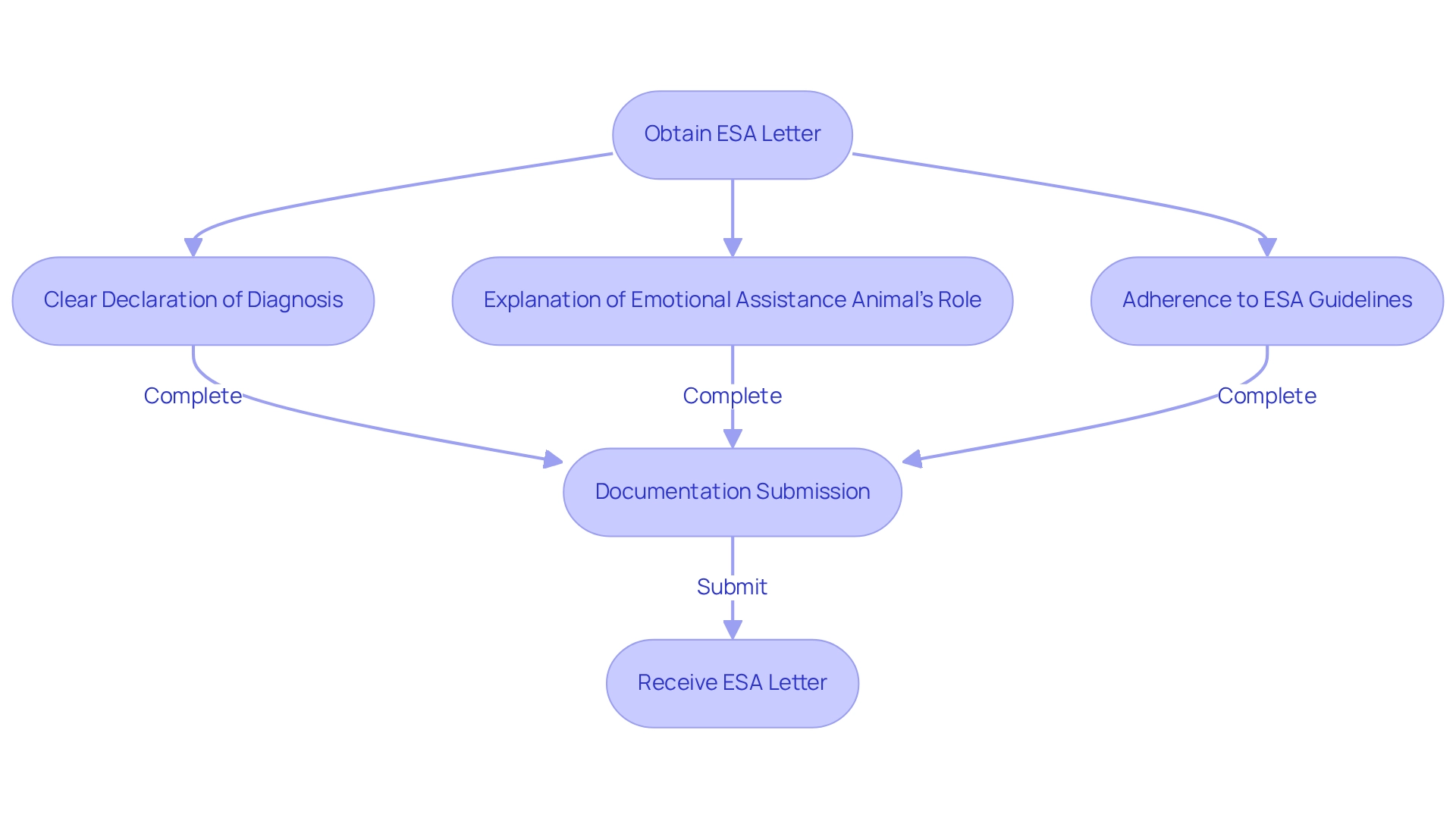
Benefits of ESA Letters for Housing and Travel Accommodations
For individuals grappling with mental health challenges, the journey can often feel overwhelming, especially when it comes to securing housing and making travel arrangements. The struggle to find a place that welcomes your emotional support animal can be disheartening. However, with a valid ESA requirement document, you can navigate these hurdles and bypass pet restrictions in housing. This not only allows you to live with your emotional support animal but also empowers you to advocate for your rights under the Fair Housing Act. Imagine the relief of knowing that you can have your beloved companion by your side in a pet-restricted environment.
Traveling can also pose significant challenges for those facing mental health issues. Airlines that recognize ESAs can provide a more pleasant travel experience, reducing anxiety and stress. Data shows that the demand for assistance dogs is increasing by 20% each year, underscoring the growing reliance on ESAs and service dogs for mental health support. In 2024, airlines reported a rise in incidents during transport, highlighting the ESA requirement for documentation to ensure smoother travel experiences.
Client testimonials reveal how acquiring ESA documents through Wellness Wag has transformed lives, allowing individuals to keep their emotional companions in various living situations. Many have shared their stories of how these documents have made a significant difference, particularly for those dealing with anxiety and PTSD. The increasing reliance on ESAs and service dogs emphasizes their essential role in mental health assistance. Professional insights affirm the positive impact of these documents on overall well-being, offering hope and support to those in need, especially as the need for assistance animals continues to grow, making the ESA requirement for housing and travel crucial. You are not alone in this journey; support is available, and these documents can help pave the way for a more comfortable and fulfilling life with your emotional support animal.
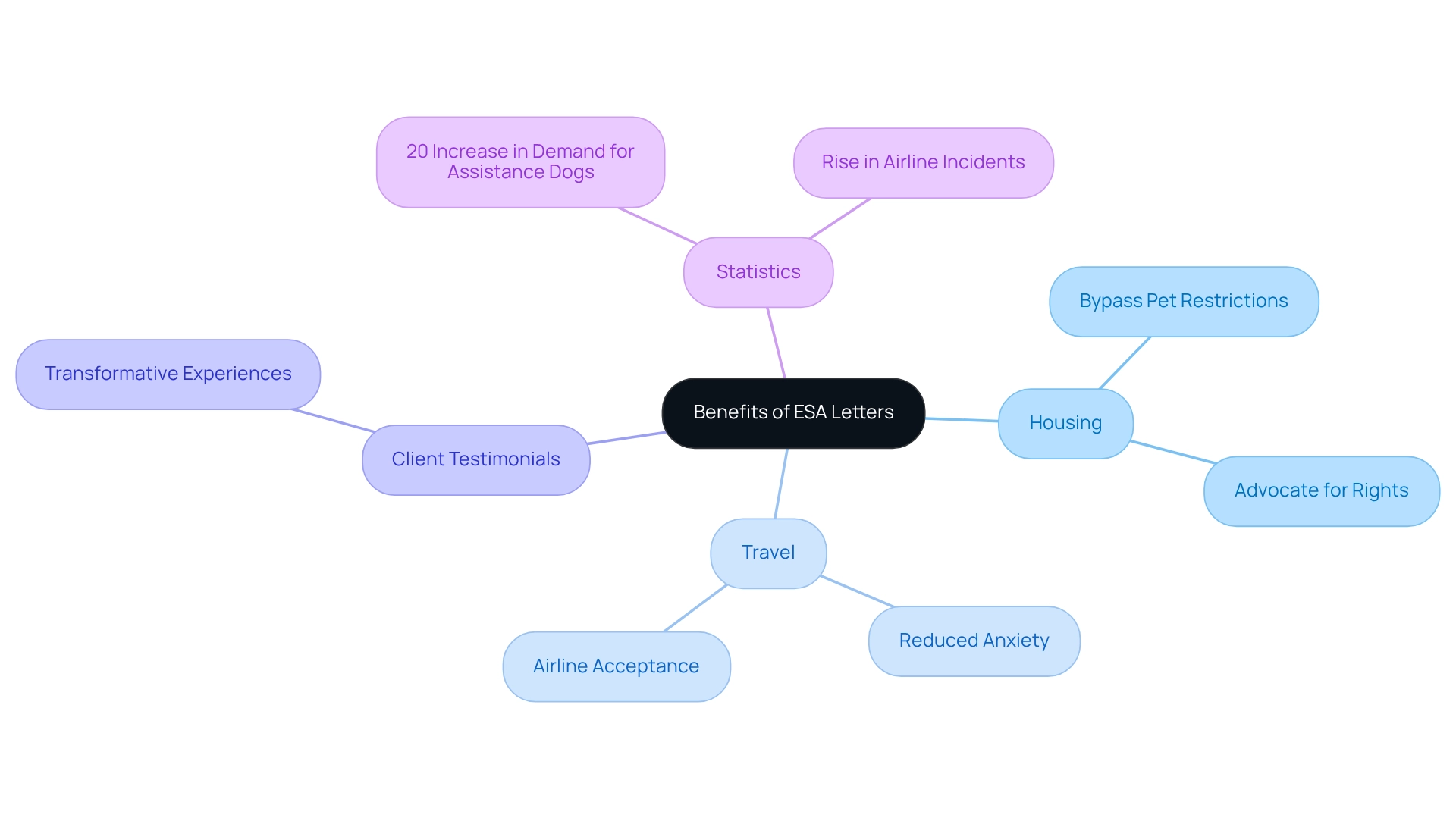
Financial Considerations and Guarantees for ESA Letter Services
When seeking services for ESA requirement documentation, it’s important to understand the financial implications, as costs can vary widely among providers. Many individuals face emotional challenges, and the financial burden can add to their stress.
Wellness Wag stands out by offering ESA documents starting at a compassionate price of $32.25, making it an accessible choice for those in need of emotional support. Additionally, the company provides a money-back guarantee, allowing clients to recover their investment if their ESA document is not accepted. This financial safety net instills confidence, enabling clients to embrace the emotional benefits of pet companionship without the worry of financial loss, particularly in light of the ESA requirement, as the average cost of ESA document services typically ranges from $50 to $150, which highlights the competitive pricing of Wellness Wag.
Many clients express satisfaction with the money-back guarantee, reinforcing the company’s commitment to customer service and trustworthiness. For example, testimonials reveal that clients who utilized the money-back guarantee often found the renewal process for their ESA letters to be straightforward and efficient, alleviating concerns about maintaining their legal rights.
This combination of affordability and assurance makes Wellness Wag a comforting choice for individuals seeking the therapeutic companionship of emotional support animals.
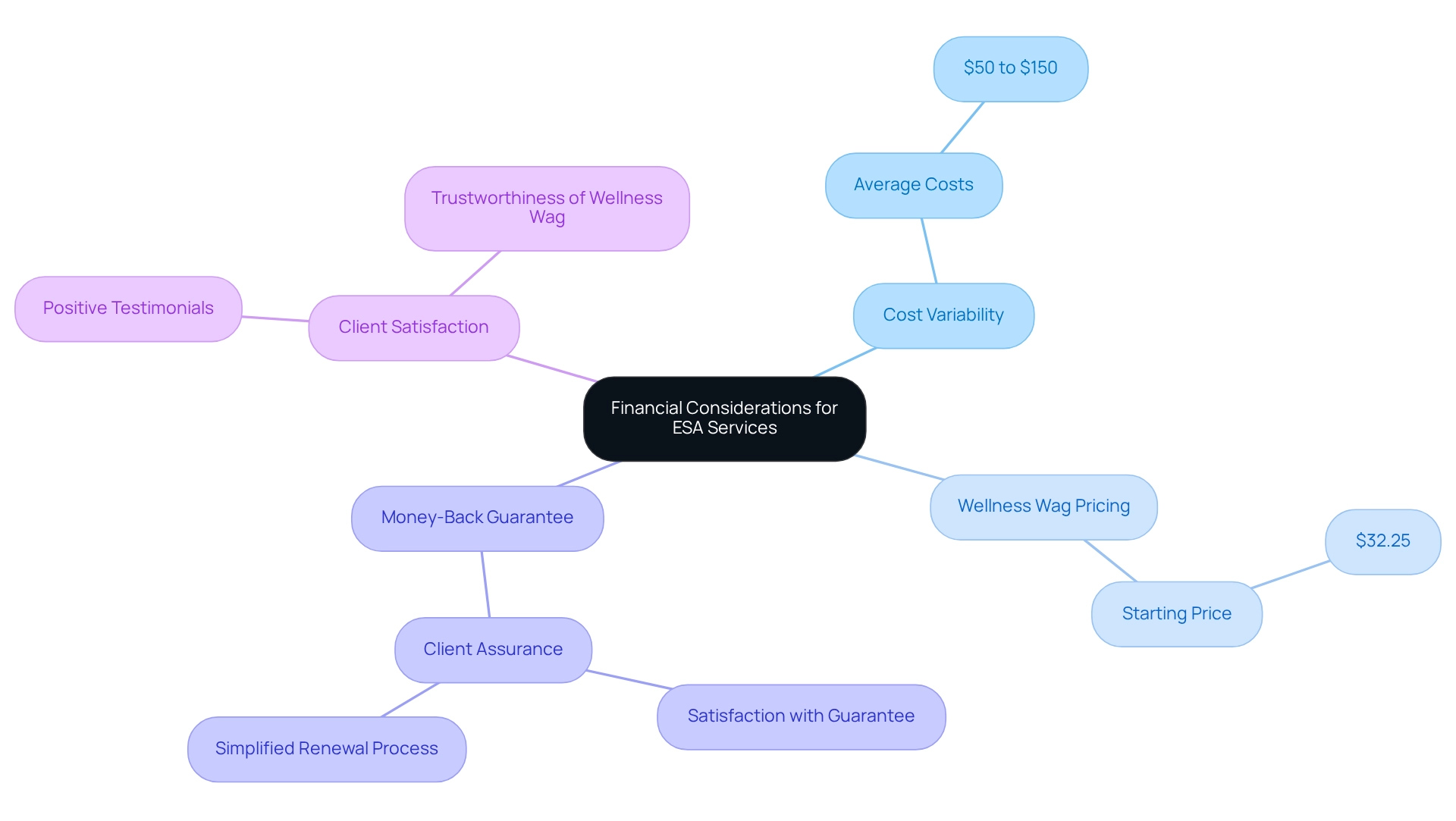
Conclusion
Navigating the journey to obtain an Emotional Support Animal (ESA) letter can be a vital step for those facing emotional challenges. Many individuals seek companionship and comfort during difficult times, and Wellness Wag emerges as a trusted ally in this process. They provide a streamlined service that emphasizes swift approvals while upholding ethical standards. The role of licensed professionals in assessing eligibility and ensuring the integrity of the ESA letter process is crucial. Their dedication to maintaining high educational and ethical standards protects the legitimacy of the letters issued, ultimately serving those in need.
Understanding the eligibility criteria and the role of certified professionals is essential for individuals seeking ESAs. This knowledge not only simplifies the approval process but also empowers clients to advocate for their rights in housing and travel situations. Additionally, the financial aspects of ESA letter services, such as Wellness Wag’s affordable pricing and money-back guarantee, enhance accessibility for those who require emotional support.
Ultimately, securing an ESA letter transcends mere paperwork; it is about nurturing meaningful connections that can profoundly enhance mental health and overall well-being. As the demand for emotional support animals continues to rise, the significance of ethical practices, professional oversight, and client education becomes increasingly important. By prioritizing these elements, Wellness Wag exemplifies a commitment to supporting individuals on their journey toward emotional well-being, ensuring that everyone can experience the profound benefits of their emotional support animal.
Frequently Asked Questions
What is Wellness Wag’s approach to helping individuals with mental health challenges?
Wellness Wag provides a user-friendly platform for acquiring Emotional Support Animal (ESA) documentation, starting with a brief assessment to determine eligibility, followed by a personalized consultation with licensed medical professionals. Once approved, individuals receive their official ESA letter within 24 hours, facilitating access to housing and travel accommodations.
How does the process of obtaining an ESA letter work?
The process begins with an eligibility assessment, followed by a consultation with licensed mental health professionals. Upon approval, individuals receive their ESA letter, which typically arrives within 24 hours. However, in some states with specific regulations, delivery may take up to 30 days.
What qualifications do professionals need to issue ESA documentation?
Licensed mental health professionals must hold at least a master’s degree in psychology, counseling, or social work to issue ESA documentation. This ensures they have the necessary skills to evaluate mental health conditions and recommend suitable emotional companions.
What are the key components of a valid ESA document?
A valid ESA document must include the healthcare provider’s signature, license information, and a detailed description of the individual’s need for emotional support. These components ensure the document’s legitimacy and access to accommodations under the Fair Housing Act and Air Carrier Access Act.
Why is it important to regularly re-evaluate with a licensed mental health professional?
Regular re-evaluation with a licensed mental health professional is essential to maintain accommodations associated with the ESA requirement. It underscores the importance of ongoing professional engagement in the ESA process.
How does Wellness Wag ensure client confidentiality and ethical practices?
Wellness Wag prioritizes the secure collection and handling of personal and health information, fully adhering to HIPAA regulations. They ensure that ESA documents are provided only to those who genuinely need emotional support animals through comprehensive evaluations, safeguarding client privacy to build trust.
What is the impact of ethical considerations in issuing ESA documentation?
Ethical considerations are vital for ensuring that ESA documentation is issued responsibly and only to those in need. Adherence to ethical guidelines protects clients and maintains the validity of ESA documents, while also enhancing the overall efficiency of the ESA requirement documentation process.
What benefits do Emotional Support Animals provide?
Research indicates that a significant number of pet owners report enhanced emotional well-being due to pet ownership, with 74% of pet owners experiencing improved mental health. This highlights the importance of ethical practices in ensuring that individuals who truly benefit from ESAs can receive the necessary documentation.
Certify Your Emotional Support Animal Today

Why You Can Rely on Us?
At Wellness Wag, we believe your pet deserves care rooted in both science and compassion. Each article is carefully researched, written in clear language for pet owners, and then reviewed by qualified professionals to ensure the information is evidence-based, current, and practical for real-life care. Our goal is to help you feel confident in making informed decisions about your pet’s health and well-being.
Reviewed by
Angela Morris, MSW, LCSW
Angela is a licensed clinical social worker with 20 years of experience in patient advocacy and community mental health. She has assisted numerous clients with ESA evaluations and brings a deep understanding of disability accommodations, ensuring that all information is accurate, supportive, and practical.

Written by :
Lena Park
Last Updated :
July 8, 2025












